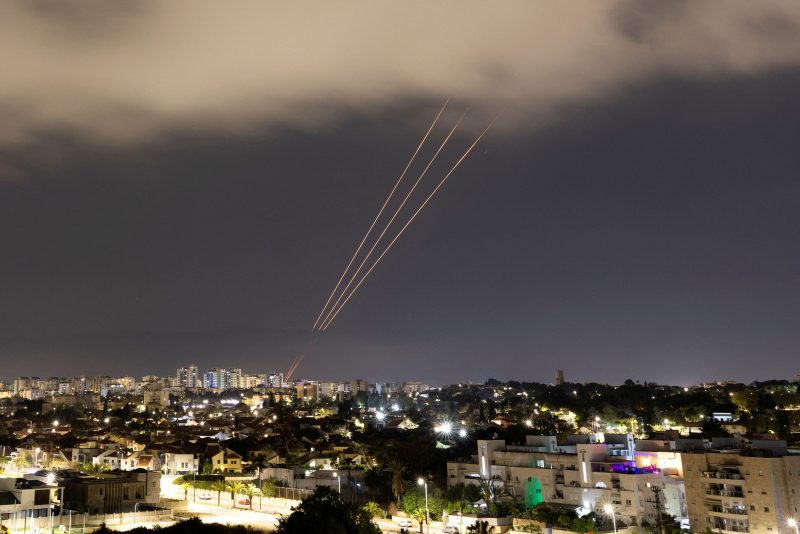JERUSALEM — Iran launched a massive attack of more than 300 missiles and drones toward Israel late Saturday, a stunning assault that put the Israeli military on high alert and threatened to unleash more violence in an already turbulent region.
Interceptions by Israel’s sophisticated air and missile defense systems began overnight, causing loud booms over Jerusalem and air raid sirens to sound across the country. The military warned citizens to brace for an attack of undetermined scale, as combat aircraft filled the sky over much of Israel. Officials closed schools and banned large gatherings as some airports in the region halted operations.
American military forces also shot down some Iranian attack drones, said U.S. officials who spoke on the condition of anonymity to discuss a sensitive and fluid operation. It did not appear that any U.S. facilities or personnel in the region were targeted by the Iranian onslaught, President Biden said in a statement condemning the “unprecedented” violence.
A spokesman for the Israel Defense Forces, Rear Adm. Daniel Hagari, speaking in a short televised briefing about 3 a.m. Sunday in Israel, said that the attack was ongoing and that the IDF had intercepted the “vast majority” of weapons launched at the Jewish state, though at least one person — a young girl — was reported injured. He called the Iranian strikes a “major escalation” and said Israeli forces were operating at “full force” to defend their country.
Tehran’s attack was “four-pronged,” according to a report by the state-run Tasnim News Agency, originating from sites in Iran, Lebanon, Iraq and Yemen. The agency is affiliated with Iran’s Islamic Revolutionary Guard Corps.
Anticipated for days, the assault followed Israeli strikes April 1 on an Iranian diplomatic compound in the Syrian capital of Damascus. Those strikes killed two Iranian generals and other Iranian military officers, eliciting from Tehran an immediate vow to retaliate.
U.S. officials quickly distanced themselves from the strikes, saying Israel had not given the United States any advance notice. Privately, a frustrated Defense Secretary Lloyd Austin later complained to Israeli Defense Minister Yoav Gallant that the Damascus operation put American forces in the Middle East at risk and U.S. officials should have known it was coming.
Iran’s counterattack required Israelis to endure a days-long, dread-filled countdown. Many families had already heeded warnings to equip safe rooms and shelters with water and food. The IDF said it had lifted a shield of fighter planes and air-defense systems over Israel and intended to intercept as many of incoming threats as it could before they entered Israeli airspace.
“Continue to act responsibly and calmly, as you have done so far, and be sure to follow the guidelines,” Hagari cautioned Israelis earlier. “ … We have prepared for a variety of scenarios in advance.”
Hagari later said Iran had launched missiles from its territory. “You may hear explosions from interceptions or debris falling,” he warned.
One official said the IDF was monitoring for additional waves of airborne attacks.
Grant Shapps, Britain’s secretary of state for defense, said in a statement that London would send additional fighter jets and tanker planes to the region, and that British aircraft “will intercept any airborne attacks within range of our existing missions, as required.” Videos circulating online showed Iranian weapons being intercepted over Amman, Jordan, early Sunday.
Biden traveled by helicopter Saturday from his Delaware beach house to the White House, where he met in the Situation Room for roughly two hours with members of his national security team, officials said. Later in the evening, he spoke by phone with Israeli Prime Minister Benjamin Netanyahu.
“I told him,” Biden said in his statement, “that Israel demonstrated a remarkable capacity to defend against and defeat even unprecedented attacks — sending a clear message to its foes that they cannot effectively threaten the security of Israel.”
Biden’s top aides will “continue to work with partners in the region to prevent further escalation,” said a U.S. defense official.
Intelligence reports had swelled for days with warnings that Tehran was poised to retaliate. The Biden administration, fearing that U.S. troops might also be targeted, began last week to dispatch more ships and warplanes to the region.
After six months of war in Gaza and fire from Iran-backed militants in Lebanon and Yemen, leaders and analysts from Washington to Cairo have warned that an attack from Tehran, especially one launched directly from Iran on Israel, could spark an even wider conflagration. Numerous top administration figures warned Iran in recent days that the United States’ support for Israel’s security was “ironclad.”
“The United States will stand with the people of Israel and support their defense against these threats from Iran,” National Security Council spokeswoman Adrienne Watson said in statement.
But earlier Saturday, Iran appeared to brush aside the cautions when Revolutionary Guard naval forces stormed the MSC Aries, an Israel-affiliated ship near the Strait of Hormuz, and diverted the vessel to Iranian territorial waters.
Shortly after the launch of what Israeli officials called “killer drones,” the Iranian IRGC said the airborne attack was aimed at “specific targets” in Israel. Iranian state media said the swarm of drones was retaliation for the Damascus strike.
Israel’s war cabinet went into an emergency session at midnight Saturday, and the Pentagon said that Austin had spoken again with Gallant. Officials in Israel, Jordan, Lebanon and Iraq closed airports and restricted airspace.
“There is no question this is an escalation. There is no question that the Iranians have now given Israel the legitimacy to attack on Iranian soil,” Yaakov Amidror, a former Israeli brigadier general and national security adviser, said in an interview.
Tensions in the region quickly spiked to perhaps their highest levels since the Oct. 7 attack on Israeli towns by Hamas and the ensuing war in Gaza.
Israel has exchanged fire across its border almost daily with Hezbollah fighters in southern Lebanon, and officials directed residents of some northern towns to seek shelter after air raid sirens sounded early Sunday. Yemen-based Houthi rebels, another Iranian proxy group, have launched hundreds of drones and missiles at Red Sea shipping and toward Israel.
But until now, a full-fledged attack by any of the Tehran-backed forces — which Hamas leader Yehiya Sinwar called for — had not materialized.
“We don’t want to fight multiple major wars at once, and so far, we haven’t had to,” an Israeli official said, speaking on the condition of anonymity to discuss security matters. “But we are ready to, and maybe that is where we are.”
Military experts said Israeli multilevel air defense networks, along with U.S.-built F-35 fighter jets, have proved effective against a range of airborne threats. Israel’s well-known Iron Dome system has frequently shown an interception rate of well over 90 percent during rocket attacks from Islamist militants in Gaza.
But with the scale and duration of the attack still unclear, they warned that Iran was capable of deploying a fearsome arsenal.
“With a combination of drones, cruise missiles and likely ballistic missiles to come, what they are trying to do is to overwhelm the system,” Amidror said. “Each is problematic by itself, but together they are more challenging. This is unprecedented. It means Iran opened a new chapter in the war.”
The IDF said it was immediately focused on defending against the attacks and would determine its response at a later time. Officials said they intended to intercept as many of the drones as possible before they reached Israeli airspace.
“If we’re not successful, then we will do what we do and what we have been doing for the last six months over Israeli skies,” the IDF official said.
Iran’s U.N. mission in New York said on X that the attack should be taken as its promised response to the strike on its diplomatic compound and that the “matter can be deemed concluded.”
But the post continued, “Should the Israeli regime make another mistake, Iran’s response will be considerably more severe. It is a conflict between Iran and the rogue Israeli regime, from which the U.S. MUST STAY AWAY!”
In Washington, Democrats and Republicans condemned the attack and asserted that Israel has a right to defend itself. While Biden’s allies in Congress praised his resolve, some in the GOP took aim at the president, saying that, by showing weakness toward Iran, he had emboldened its regime.
Sen. Jack Reed (D-R.I.), chairman of the Senate Armed Services Committee, credited Israelis, Americans and unnamed regional partners “who worked together to shoot down hundreds of Iranian drones and missiles through the night.” The United States will stand alongside Israel, he said, urging Iran to cease the attack and Israel to “act with prudence and wisdom.”
House Speaker Mike Johnson (R-La.), who for months has blocked a spending bill that would send billions of dollars in additional military aid to both Israel and Ukraine, called the attack by Iran “vicious,” and said the United States must show “full resolve” as it stand with Israel.
“I will continue to engage with the White House to insist upon a proper response,” Johnson said, not mentioning the stalled aid package. “The Biden Administration’s undermining of Israel and appeasement of Iran have contributed to these terrible developments.”
Senate Minority Leader Mitch McConnell (R-Ky.) implored Biden to “lead an international effort to impose sufficient costs on Tehran” and urged the House to pass the $95 billion national security supplemental funding, which he noted “has waited months for action.”
Biden, in his statement, said that he would convene a group of world leaders to coordinate a diplomatic response to Iran’s attack.
“While we have not seen attacks on our forces or facilities today,” Biden said, “we will remain vigilant to all threats and will not hesitate to take all necessary action to protect our people.”
Lamothe and Horton reported from Washington. Lior Soroka and Alon Rom in Tel Aviv, Loveday Morris in Berlin, Susannah George in Muscat, Oman, and Pradnya Joshi in Washington contributed to this report.



























